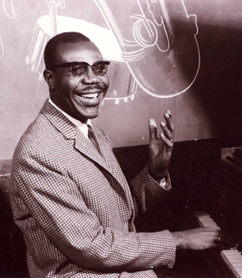|
 Dibango, Manu (N'Djock‚, Emmanuel Dibango), distinguished Cameroonian saxophonist, arranger, and band leader; born Douala, Dec. 12, 1933; died Paris, March 24, 2020. Dibango, Manu (N'Djock‚, Emmanuel Dibango), distinguished Cameroonian saxophonist, arranger, and band leader; born Douala, Dec. 12, 1933; died Paris, March 24, 2020.
One of Africa's best-known and most durable musicians, Dibango discovered his affinity for music in a Douala church. He was raised to the age of fifteen in Cameroon then shipped off to France to continue his high school education. There he was smitten with jazz and began to learn mandolin, piano, and eventually saxophone and vibraphone. Sax became his primary instrument when he moved to Brussels at the end of high school in 1956 to take a job playing jazz standards in the house band of the Tabou night club.
The year 1960 found Dibango playing the Anges Noirs in Brussels where he met Congolese singer Joseph Kabasele and his African Jazz. Dibango made his first recordings with African Jazz the following year, then joined the band in Congo-Kinshasa for a re-introduction to Africa that would encompass two years, gigs with African Jazz, and jobs as operator and band leader of two Kinshasa (Léopoldville) clubs. He scored his first hit during this period with "Twist à Léo" recorded in 1962.
Back in France in the mid-sixties, Dibango covered pop standards and soul hits in various groupings and played behind French pop singers Dick Rivers and Nino Ferrer. Near the end of the decade he recorded a series of Afro-Latin-jazz fusion albums with Kabasele and Cuban flutist Don Gonzalo under the name African Team. A solo album, Saxy Party, came out in 1969. Dibango also arranged the music and played piano and sax for singer Franklin Boukaka on the excellent Franklin Boukaka à Paris from 1970.
Dibango kept a band of his own together more or less permanently from the early seventies onward. Although personnel varied, Congolese guitarist Jerry Malekani, formerly of Ry-Co Jazz, usually anchored the group that included bass, drums, and often piano, trumpet, and singers. Personally, Dibango began to cultivate something of a sinister look with shaven head and dark glasses that masked his natural affability.
In Cameroon in 1972 Dibango wrote and recorded his biggest hit, "Soul Makossa." He played sax on the piece and delivered its scant lyrics in a kind of half-whispered sing-speak that would become one of his trademarks. Another version of the song became part of the album O Boso for Belgian Decca, which eventually licensed it to Atlantic Records. The song's popularity led to two Grammy nominations in 1973, a gold record in France (100,000 sales), and Dibango's first U.S. tour (1973), which included dates at the Apollo Theater, Yankee Stadium, and Constitution Hall.
Dibango's inquisitiveness took him to Jamaica at the end of the seventies for two first-rate reggae albums, Gone Clear (released in 1980) and Ambassador (1981), recorded with greats like Sly Dunbar, Robbie Shakespeare, and Geoffrey Chung. The Dibango-produced "Tam-Tam Pour L'Ethiopie" (drum for Ethiopia), recorded in 1985 with a number of African pop stars including Mory Kanté and M'Pongo Love, raised money for refugees in drought-stricken Ethiopia. Dibango ventured into the idiosyncratic world of electronic music for the single "Abele Dance" (1984) with Paris producer Martin Meissonnier and Electric Africa (1985) with Bill Laswell. Afrijazzy (1986) returned to his jazz and African roots. At decade's end he composed music for the Canadian film How to Make Love to a Negro Without Getting Tired.
Despite the passage of his sixtieth birthday, Dibango maintained a steady concert schedule. The CD Wakafrika (1994) remade a number of African hits, including Dibango's own "Soul Makossa," in the company of guest stars Youssou N'Dour, Salif Keita, Papa Wemba, and several others. Mboa'Su (2000) incorporated songs in many of the styles he played over the years, including jazz, reggae, and Congolese rumba.
By his own account Dibango has struggled to reconcile two, often contrary, yearnings: his desire to partake of the intellectual life of Europe and his longing for the sensual spirit of Africa. The search for accommodation seems reflected in his music. He plays jazz with an African touch or reggae with a taste of Paris. "Soul Makossa" linked a Cameroonian rhythm with American soul. His love of experimentation precluded a commercial follow-up to his big hit and any chance at a long-term recording contract. Instead, he pursued a creative agenda of his own design, which limited his mass-market appeal. A versatile and broadly talented musician, Dibango has produced a memorable body of work in his own name and, as an arranger and accompanist, elevated the creations of many others. He died from the effects of the COVID-19 coronavirus.
© 2011 and 2020 Gary Stewart
SELECT DISCOGRAPHY
Soul Makossa (Atlantic LP SD7267) 1972; Gone Clear (Island ILPS9539) 1980; Ambassador (Mango MLPS9658) 1981; Electric Africa (Celluloid LP CEL6114) 1985; Afrijazzy (Mélodie 85902-2) 1986; Live '91 (Soul Paris 662021) 1991; Wakafrika (Giant 9 24566-2) 1994; cubAfrica (with Cuarteto Patria, Soul Paris 79593-2) 1998; Mboa'Su (JPS, CDJPS64) 2000.
SELECT BIBLIOGRAPHY
C. Stapleton & C. May, African All-Stars (London, 1987); G. Ewens, Africa O-Ye! (London, 1991); M. Dibango, Three Kilos of Coffee (Chicago, 1994); G. Santoro, "Manu Dibango," The Nation (Oct. 24, 1994); G. Stewart, Rumba on the River (London and New York, 2000).
|

